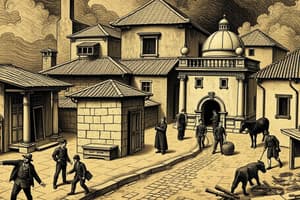Podcast
Questions and Answers
What is primarily studied in the field of history?
What is primarily studied in the field of history?
- Geographical landscapes
- Mathematical theories
- Artistic expressions
- Past events, particularly in human affairs (correct)
Which period is known for the rise of nation-states and colonialism?
Which period is known for the rise of nation-states and colonialism?
- Medieval History
- Ancient History
- Prehistoric Era
- Early Modern Period (correct)
What concept refers to the social, political, and economic environment surrounding events?
What concept refers to the social, political, and economic environment surrounding events?
- Perspective
- Context (correct)
- Chronology
- Causation
Which of the following is an example of a primary source?
Which of the following is an example of a primary source?
Who is often referred to as the 'Father of History'?
Who is often referred to as the 'Father of History'?
Which challenge in history refers to the alteration of interpretations due to varying perspectives?
Which challenge in history refers to the alteration of interpretations due to varying perspectives?
What is the study of how history has been written and interpreted over time called?
What is the study of how history has been written and interpreted over time called?
Why is studying history considered significant?
Why is studying history considered significant?
Flashcards are hidden until you start studying
Study Notes
Definition of History
- Study of past events, particularly in human affairs.
- Involves analysis of sources, interpretation of events, and understanding of contexts.
Key Concepts
- Chronology: Sequence of events in time.
- Causation: Understanding why events occurred.
- Context: Social, political, and economic environment surrounding events.
- Perspective: Influence of viewpoint on interpretation of history.
Major Periods in History
-
Prehistoric Era
- Time before written records.
- Includes the Stone Age, Bronze Age, and Iron Age.
-
Ancient History (c. 3000 BCE – 500 CE)
- Development of writing, civilizations like Mesopotamia, Egypt, Indus Valley, and China.
- Classical civilizations: Greece and Rome.
-
Medieval History (c. 500 – 1500 CE)
- Feudalism, rise of empires, and the spread of religions (Christianity, Islam).
- Significant events: The Crusades, the Black Death.
-
Early Modern Period (c. 1500 – 1800 CE)
- Renaissance, Enlightenment, and exploration.
- Rise of nation-states and colonialism.
-
Modern History (c. 1800 – present)
- Industrial Revolution, World Wars, Cold War.
- Contemporary issues: globalization, technology, and human rights.
Key Historical Methods
- Primary Sources: Original documents or artifacts (e.g., letters, diaries).
- Secondary Sources: Interpretations or analyses based on primary sources (e.g., textbooks, articles).
- Historiography: Study of how history has been written and interpreted over time.
Important Historical Figures
- Herodotus: Often called the "Father of History."
- Thucydides: Known for his work on the Peloponnesian War.
- Karl Marx: Influential in the understanding of socio-economic history.
- Howard Zinn: Known for "A People’s History of the United States."
Significance of History
- Understanding past societies, cultures, and events helps inform present and future decisions.
- Provides context for current events and social issues.
- Encourages critical thinking and analysis of sources.
Challenges in History
- Bias in Sources: Different perspectives can alter interpretations.
- Incomplete Records: Many events lack comprehensive documentation.
- Historical Revisionism: Re-examination of historical narratives can lead to new interpretations.
Conclusion
- History is a vital field of study that helps us understand humanity's past, informing our present and guiding our future.
Definition of History
- Encompasses the study of past events, particularly human activities.
- Involves analyzing sources, interpreting events, and comprehending various contexts.
Key Concepts
- Chronology: Arrangement of events in the order they occurred.
- Causation: Investigation into the reasons behind events.
- Context: Analysis of the social, political, and economic conditions influencing events.
- Perspective: Recognition of how individual viewpoints shape historical interpretations.
Major Periods in History
- Prehistoric Era: Pre-dates written history, including the Stone, Bronze, and Iron Ages.
- Ancient History (c. 3000 BCE – 500 CE): Marked by the advent of writing and significant civilizations such as Mesopotamia, Egypt, Indus Valley, and China, alongside classical eras in Greece and Rome.
- Medieval History (c. 500 – 1500 CE): Characterized by feudalism, rising empires, and the spread of major religions like Christianity and Islam; notable events include the Crusades and the Black Death.
- Early Modern Period (c. 1500 – 1800 CE): Featured the Renaissance, Enlightenment, and age of exploration; emergence of nation-states and colonial expansion.
- Modern History (c. 1800 – present): Defined by the Industrial Revolution, World Wars, and the Cold War; contemporary themes include globalization, technology, and human rights concerns.
Key Historical Methods
- Primary Sources: Original materials such as letters and diaries that provide firsthand accounts.
- Secondary Sources: Analyses and interpretations derived from primary sources, including textbooks and scholarly articles.
- Historiography: Examination of the history of historical writing and evolving interpretations.
Important Historical Figures
- Herodotus: Known as the "Father of History" for his seminal works on historical methodology.
- Thucydides: Renowned for his critical account of the Peloponnesian War.
- Karl Marx: Key figure in socio-economic historical analysis and critique of capitalism.
- Howard Zinn: Famous for "A People’s History of the United States," emphasizing perspectives of marginalized communities.
Significance of History
- Enables understanding of past societies and events, which is crucial for informing present and future decisions.
- Provides necessary context for contemporary issues and encourages well-rounded critical thinking and source analysis.
Challenges in History
- Bias in Sources: Different perspectives can significantly affect historical interpretations.
- Incomplete Records: Many historical events lack detailed documentation, hindering comprehensive understanding.
- Historical Revisionism: New interpretations and re-examinations can reshape understanding of historical narratives.
Conclusion
- Studying history is essential for grasping humanity's past, informing present realities and guiding future actions.
Studying That Suits You
Use AI to generate personalized quizzes and flashcards to suit your learning preferences.




